- Home
- Hammond Innes
Attack Alarm Page 17
Attack Alarm Read online
Page 17
“Don’t be silly,” I said.
“Well, wot’s the idea, then? You got a hideout you don’t want me to share—that’s it, is it?”
I hesitated. It didn’t seem to matter much if I told him the truth. “I haven’t got a hideout at all,” I said. “You see, I’m really not deserting. In a few hours’ time I shall be back at the aerodrome.”
“If you do it’s the glasshouse for you and a brick wall, I tell you, mate. Anyway, if you’re going back, wot’s the good of getting out.”
“Because I had to get to a certain farm to-night,” I said. “I’m playing a lone hand against a gang of fifth columnists. They’ve got a plan by which they will help Germany to capture our fighter aerodromes. I aim to stop them.”
He looked at me. In the faint light from the dashboard I noted the sidelong, furtive glance. “You ain’t kidding?”
I shook my head. “No,” I said.
“Sure?”
“Cross my heart.”
A sudden gleam came into his small close-set eyes. “Cor lumme!” he said. “Wot a break! Like a book I bin reading all about gangsters in America. Will they have guns?” he asked.
“Probably,” I said. And I couldn’t help grinning though I felt queasy inside because it was so near to zero hour.
“Cor lumme!” he repeated. “That’s the way I like to fight—’and to ’and. I wouldn’t ’alf like to give a Jerry a sock in the kisser—just one and I’d be ’appy. Come on! Let’s get at ’em.”
I glanced at him. It was incredible. A coward in the face of bombs, yet here was the spirit that made British Tommies go in fearlessly with rifle and bayonet against an enemy armed with light automatics. Again I hesitated. He looked as though he might be useful in a rough-house—small and tough, probably a dirty fighter. I had no illusions about my own abilities in a fight. He might be very useful.
“All right,” I said, and slipped the lorry into gear again. “But there may be no scrap and no gang of Nazis. I may be wrong.”
I changed quickly up into top and just kept the engine ticking over, so that we made little noise as we ran across that flat open heath. The road was nothing more than a rough gravel track. And in the dim moonlight the country ahead and on either side looked desolate. There were no trees, and the only relief from the interminable heather was the gnarled and twisted skeleton of gorse bushes, black and flowerless from a recent fire. My uneasiness grew with my surroundings.
“Cor, don’t ’alf seem creepy,” Micky muttered, voicing my own thoughts. I couldn’t help remembering Childe Rolande to the Dark Tower Came. There was a very slight mist and the place reeked of desolation. When last I had seen Ashdown Forest it had been in sunlight, and it had seemed warm and friendly, with autumn tints glowing in the heather. I had been motoring down to Eastbourne to spend a week-end with some friends. Now it was no longer friendly, and I thought of the Ancient Britons who had fought and died here in their hopeless attempt to stem the tide of Caesar’s advancing legions. So many of the more desolate parts of Britain seem to house the ghostly memory of that tragic race.
The track forked. Evidently I was on the right road. I swung right. The road was now definitely no more than a cart track, grass-grown in the middle and full of pot-holes. At the end of it should be Cold Harbour Farm.
I passed an even smaller track leading off to the right. Then a patch of gorse bushes seemed to jump up at me out of the pale mist. I braked and swung the lorry off the track. It was time, I felt, to carry out some sort of reconnaissance. I stopped so that the lorry was screened as far as possible from the track and climbed out.
Micky followed. “Where do we go now?” he asked in a hoarse whisper.
“Up this track,” I said. “It should lead us to a place called Cold Harbour Farm.”
“Cor, stone me, wot a name!”
We went on in silence, two shadows slinking through the pale ethereal light, our canvas shoes making no sound on the baked surface of the path. About a quarter of a mile farther on we passed through a gate. It was open and its rotting timbers hung drunkenly from rust-eaten hinges. Painted roughly on it was the name—Cold Harbour Farm.
The track swung away to the left, and a little farther on we got our first glimpse of Cold Harbour Farm, a low, rambling building with a jumble of outhouses and a big barn at the farther end.
“Sort o’ spooky, ain’t it?” whispered Micky. It was one of those buildings that look dilapidated even at a first glance—an untidy place, with gables. There was still no sign of a tree, only the stunted gorse bushes. Neglect had allowed them to encroach to the very door.
We moved stealthily now, leaving the path and crossing what seemed once to have been a garden, for there were vestiges of rhododendrons and even roses amongst the choking growth of heather and gorse. We took the building in the flank and came out upon what had once been a gravel terrace. The gabled wing of the house looked dark and deserted. The roof tiles were green with moss and broken in places, and the woodwork of gables and windows was rotting. Everything was deathly still in the damp air. We crept round to the front. It was a long building and must at one time have been owned by quite a prosperous family. The sweeping outline of a drive was still visible amidst the chaos of the advancing heath. I gazed along the whole length of the decaying building. No chink of light showed in any of the windows. No sound disturbed the stillness of the night. Ivy had taken a stranglehold everywhere. Undisturbed, it billowed up even to the roof.
My heart sank as I looked at the place. I just couldn’t see Vayle making it his headquarters. London seemed a much more likely place for him to meet other agents. Out here in this God-forsaken spot every visitor was bound to be noticed and commented upon by whatever local inhabitants still existed in the neighbourhood.
In any case, the house, being quite a big one, would in itself be a subject for gossip.
I went up to the front door. It was clearly not the original door, for it was of cheap deal with a brass handle. The brown paint was cracked and peeling. I tried it, and to my surprise it gave to my pressure, creaking slightly as I pushed it open.
We went in and I closed it behind us. All was silent in the darkness of the house. No, not quite. Faintly came the ticking of a clock. It sounded somehow homely, suggesting that the place was inhabited. I switched on my torch. We were in a big low-ceilinged hall. In front of us was a flight of narrow stairs covered with a threadbare carpet. The hall itself was flagged with here and there a tattered rug. There was a fine old refectory table with straight-backed chairs. The rest of the furniture was Victorian. The place looked dirty and neglected. The huge open fireplace was littered with fallen plaster, and the ceiling, which showed in strips between the heavy oak beams, was blackened and in places had crumbled so that the laths were visible.
I opened the door to our left and flashed my torch round. It was a big room with Victorian furniture of the ugliest and most uncomfortable type, the walls covered with photographs and texts and every flat surface a jumble of knick-knacks. French windows led on to the terrace by which we had just approached the house. The heavy plush curtains were undrawn. There was no black-out and several panes were missing. The air felt damp and stale. The room was obviously not lived in.
“Puts me in mind of one of them smash-up-the-’appy-’ome tents at a fair,” whispered Micky. “I couldn’t ’alf do something to all them little bits of china wiv a couple o’ cricket balls.”
I closed the door and we crossed the hall to the door at the far end. This led to a smaller and more homely room. The Victorian furniture had been blended with additions from Drages, and in the far corner a rather fine grandfather clock ticked away impassively, the brass of the pendulum flicking back and forth across the glass porthole of its case. The time was twelve-fifteen. There were the burnt-out cinders of a recent fire in the grate.
Back in the hall I tried the only door we had not yet looked through. This was to the left of the hearth and led to a cold brick-floored passage. I went down it f
ull of a wretched feeling of depression. Either there had been nothing in the coincidence of Elaine Stuart and the injured workman both talking of Cold Harbour Farm whilst unconscious or else I had picked on the wrong one. I felt suddenly hot and chaotic with anxiety. If I had picked on the wrong one and something did happen this morning, it would be horrible. Looking back, my efforts to defeat Vayle seemed so puny and haphazardly organised—much too haphazardly organised.
I stopped before a door. Micky, following me, bumped into me. I suppose he must have put out his hand to keep his balance, for out of the corner of my eye I caught sight of something white falling, and the silence of the house was Splintered by what seemed to be the most appalling crash. I turned the beam of my torch downwards. On the red brick floor lay the shattered remains of a white vegetable dish patterned with blue flowers. We stood motionless, listening. Not a sound disturbed the stillness of the house save the gentle ticking of the clock in the small room. In the quiet it had seemed shatteringly loud. If there were any one in the house it must surely have woken them.
I opened the door and we passed through into a typical farmhouse kitchen, big and rambling, with sculleries, a boiler house and a lavatory. There was no sign of dirty crockery. We wandered through into the scullery. Beyond was what had once been the dairy. Most of the whitewash had powdered off the walls, but in a comer there was still the old butter churn. I don’t know why I had pursued my search of the house to the kitchen. I had no idea what I was searching for. I went on automatically. But I knew I should find nothing. The furniture, the dilapidation—it was all in keeping. This was no centre of a fifth columnist organisation. I felt sick with anxiety. It was a mistake to have left the ’drome. I had laid myself open to a charge of desertion and gained nothing by it. I forgot in that moment that I had gone in fear of my life at the ’drome.
We had just gone back into the kitchen when a pale light showed in the open doorway leading to the passage. I snapped my torch off. The light grew steadily brighter. There was a shuffling sound along the brick floor of the passage. I heard Micky’s sharp intake of breath close beside me. I stood there, fascinated by the light that showed the framework of the door and made dark shadows of every piece of peeling plaster. I made no attempt to hide.
Suddenly a guttering candle came into view. And the bony hand that held it shook slightly. And then appeared an apparition that seemed to have walked straight out of Dickens. It was an old gentleman dressed in a nightgown with a faded dressing-gown over it. He wore a red woolly night-cap and in his hand he held a poker. My first inclination was to laugh. It really was an incredible sight. But despite his costume he had a certain dignity. He stopped at the sight of us and blinked at us through his steel-rimmed glasses. “Soldiers, eh?” he said.
I nodded. I suddenly felt a most frightful fool. Much more of a fool than when Vayle had caught me in his rooms. “I—I’m sorry,” I said. “We thought the house was deserted. We were hitch-hiking home and lost our way trying to make a short-cut to the Eastbourne road. We thought we might find shelter for the night. The front door was open,” I finished lamely.
“Tut-tut,” he said, and fingered his drooping white moustache. “Don’t say I forgot to lock the door again. I’m getting very forgetful. And the house is a little in need of repair. You want shelter for the night, you say?”
I nodded. I could think of nothing to say.
“Well, well, I expect that could be arranged. It won’t be very comfortable, I fear. I’m a bit of a recluse these days—at least that’s what the neighbours think. Let me see now. There’s the room next to mine. There’s a double bed there and I expect we could find you some blankets. You’re quiet fellows, I hope?” He peered at us closely. “I sleep very light now. Getting on, you know.”
“Really, sir,” I said, “it’s awfully kind of you. But we wouldn’t dream of bothering you.”
His eyes stopped blinking and looked straight into mine. They were very blue eyes, I remember. “You said you wanted shelter for the night, didn’t you?”
“Yes, sir, but we”
“Well, then,” he interrupted me, “don’t haver, man. It’s the least we can do for our gallant lads. Now you’ll be wanting something to eat, I expect. I see you had found your way to the kitchen all right.” He chuckled as he shuffled over to the pantry.
It was an impossible situation. I looked at Micky. “Do we stay?” I asked.
“’Course we stay,” he whispered.
There was nothing else for it. I hadn’t the heart to walk out on the dear old boy. Besides, there was no point in doing so. We might just as well sleep here as anywhere else. If anything was going to happen that morning there was nothing I could do about it now. This was the wrong Cold Harbour Farm. That’s all there was to it. Probably there had never been a right one. God, what a fool!
The old boy fussed over us like a mother. We had cold ham—heaven knows where he got that ham from, for it was a big one—and bread and butter, and milk to drink. It wasn’t till I smelt that ham that I realised I was very hungry. I enjoyed that meal. He talked mostly of the Boer War. And afterwards he took us upstairs to a room under one of the gables. He gave us blankets and lit a candle for us. “Good-night,” he said, bobbing his funny little red cap at us. “I trust you sleep well,” He closed the door on us and a second later the key ground in the lock.
That startled me a bit, I must say. My first reaction was to glance at the window. The room had evidently been a nursery at one time, for it had small iron bars across it. My instinct was to beat upon the door and demand that it be unlocked. But when I looked at Micky and then at myself in the black-marked mirror over the mantelpiece, I couldn’t altogether blame him. We looked a pretty disreputable pair, with dark rings of sleeplessness under our eyes and torn, dirty clothes.
Micky, who had as usual made a very heavy meal, threw himself on to the bed just as he was. “The old boy’s a bit of orl right, ain’t he,” he said. A grunt of satisfaction and he closed his eyes, not bothering about the blankets. Eating and sleeping were Micky’s sole recreations in the Army. There was nothing for it but to follow his example. I took off my battle blouse and shoes and lay down beside him, pulling a blanket up over me.
But sleep did not come easily. I was worried about what might happen. And I was worried, too, about how my escapade would be regarded. Would Ogilvie believe my explanation when I reported for duty again, or should I find myself under close arrest for desertion.
I suppose I must have dosed off, but I don’t remember waking. I just found myself suddenly in a state of complete consciousness and felt that I must have been awake all the time. Then I realised that my mind was alert yet not concentrated on the troubles that had been worrying me. For a moment I did not understand why this was. Then I heard it. Faintly came the sound of what I thought at first must be a car grinding along in bottom. I was just turning over to go to sleep again, thinking it must be on the main road, when I remembered that the road was some distance away—too far for the sound to travel unless the wind carried it and the night was still. Moreover, there was no reason for a car to be travelling along that road in bottom.
The sound gradually drew nearer. Suddenly I realised that it wasn’t a car at all. It was much heavier. And it was much nearer than the road. I jumped out of bed and went to the window. The moon was well up now, and though there was still a slight mist I could see something moving behind a clump of gorse bushes about five hundred yards away. When it came out into the open I saw it was a lorry. Another followed close behind and then a third. I watched them as they disappeared, merging into the mist. The sound of their engines gradually dwindled. I waited and was at last rewarded by the sight of a glimmer of light on the main road. Two other lights followed. They were moving south.
I glanced at my wrist-watch. It was just after one. Three hours to go to the first light of dawn. I hesitated. Those might have been Army lorries. But I remembered that the injured workman had spoken of driving to Cold Harbour. What I
was looking for might not be at the farm itself. The farm might be quite harmless, and yet something—an arms dump, for instance—might be located in the vicinity and referred to as Cold Harbour for convenience.
But I still hesitated. I had lost all confidence in my own judgment. I was afraid of making a bigger fool of myself than I feared I had done already. And whilst I was standing there trying to figure it out there came again that faint sound of engines grinding in low gear. I watched the clump of gorse bushes behind which I had first seen the three lorries. There were four this time. I waited till I could see their lights on the main road. They, too, had turned south.
I swung round from the window, my mind suddenly made up.
“Micky!” I called softly, shaking him by the shoulder. “Micky! Wake up!”
“Uh?” He rolled over and blinked his eyes at me sleepily. “Wasamatter?”
“We’ve got to get out of here,” I told him.
“I don’t see why. We’re very comfortable, ain’t we?”
“Yes, but there’s something funny going on.”
“You just tell me when to laugh,” he mumbled, “and I’ll laugh.”
“Don’t be a fool,” I said, and shook him violently.
“Orl right, orl right,” he grumbled and grumbled off the bed. “Wot’s the trouble?”
I told him what I had seen. “I want to try and find out where the lorries are coming from and what they’re carrying. And we haven’t much time,” I added. I had got into my battle top and was putting on my shoes.
“Probably the poor bleedin’ infantry doing night ops.,” he said unhelpfully. He was still half asleep.
I went over to the window. It was a drop of about twenty feet and it wasn’t soft landing. However, the ivy looked pretty tough. The only difficulty was the bars. They were much stronger than most nursery window bars. Moreover, when I looked at them closely I found that they were not the type that screw into the window frame, but had been cemented into deep sockets.

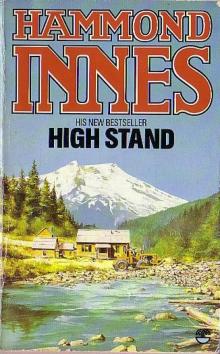 High Stand
High Stand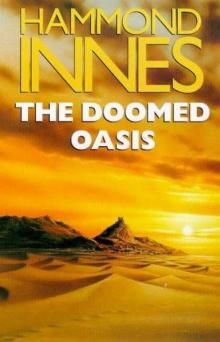 The Doomed Oasis
The Doomed Oasis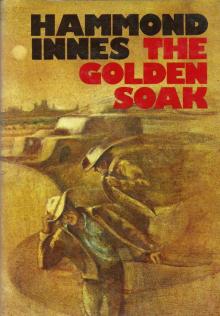 Golden Soak
Golden Soak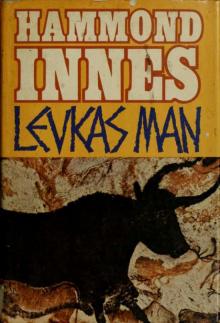 Levkas Man (Mystery)
Levkas Man (Mystery)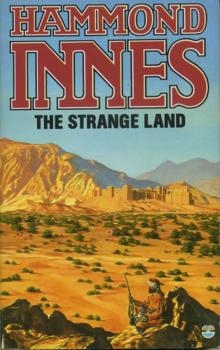 The Strange Land
The Strange Land Dead and Alive
Dead and Alive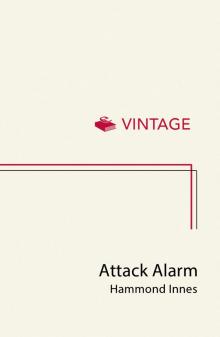 Attack Alarm
Attack Alarm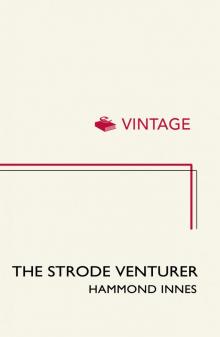 The Strode Venturer
The Strode Venturer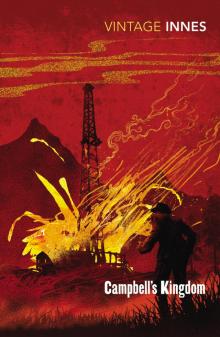 Campbell's Kingdom
Campbell's Kingdom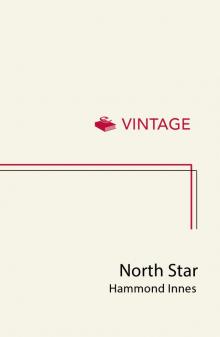 North Star
North Star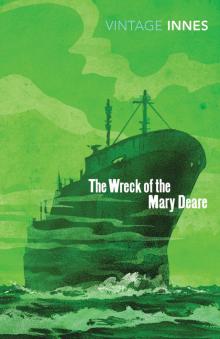 The Wreck of the Mary Deare
The Wreck of the Mary Deare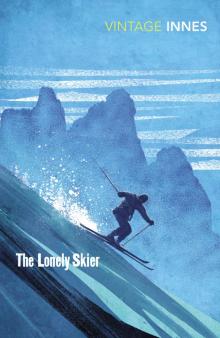 The Lonely Skier
The Lonely Skier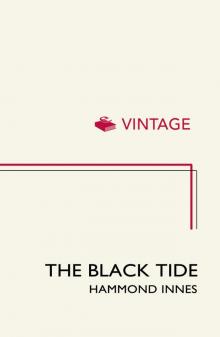 The Black Tide
The Black Tide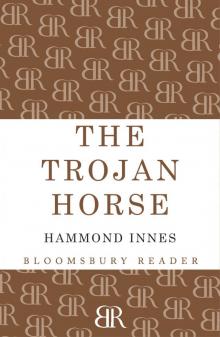 The Trojan Horse
The Trojan Horse Medusa
Medusa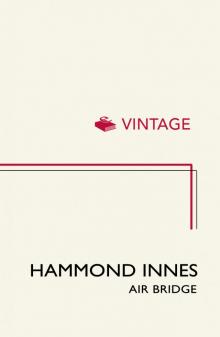 Air Bridge
Air Bridge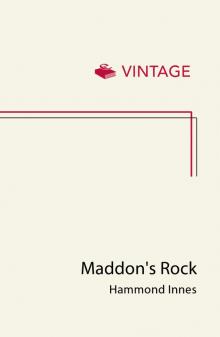 Maddon's Rock
Maddon's Rock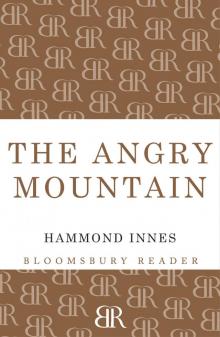 The Angry Mountain
The Angry Mountain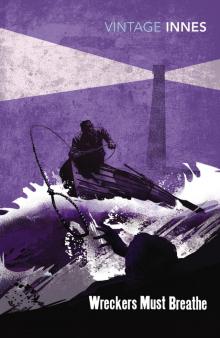 Wreckers Must Breathe
Wreckers Must Breathe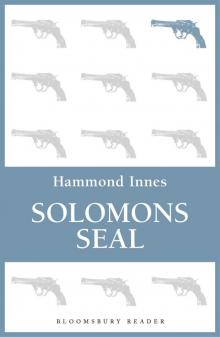 Solomons Seal
Solomons Seal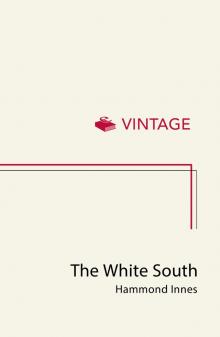 The White South
The White South